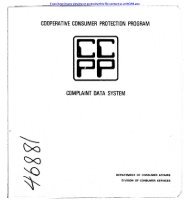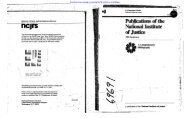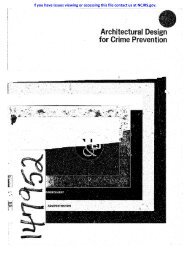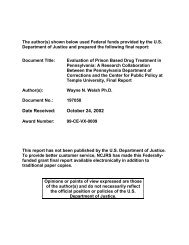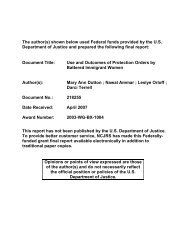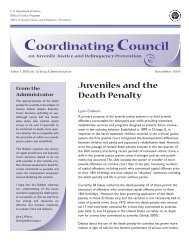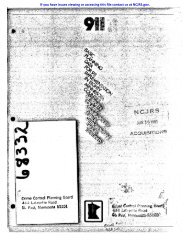Department of Defense Nonlethal Weapons and Equipment Review
Department of Defense Nonlethal Weapons and Equipment Review
Department of Defense Nonlethal Weapons and Equipment Review
Create successful ePaper yourself
Turn your PDF publications into a flip-book with our unique Google optimized e-Paper software.
About the National Institute <strong>of</strong> Justice<br />
NIJ is the research, development, <strong>and</strong> evaluation agency <strong>of</strong> the U.S. <strong>Department</strong> <strong>of</strong> Justice.<br />
The Institute provides objective, independent, evidence-based knowledge <strong>and</strong> tools to enhance<br />
the administration <strong>of</strong> justice <strong>and</strong> public safety. NIJ’s principal authorities are derived from the<br />
Omnibus Crime Control <strong>and</strong> Safe Streets Act <strong>of</strong> 1968, as amended (see 42 U.S.C. §§ 3721–3723).<br />
The NIJ Director is appointed by the President <strong>and</strong> confirmed by the Senate. The Director establishes<br />
the Institute’s objectives, guided by the priorities <strong>of</strong> the Office <strong>of</strong> Justice Programs, the<br />
U.S. <strong>Department</strong> <strong>of</strong> Justice, <strong>and</strong> the needs <strong>of</strong> the field. The Institute actively solicits the views <strong>of</strong><br />
criminal justice <strong>and</strong> other pr<strong>of</strong>essionals <strong>and</strong> researchers to inform its search for the knowledge<br />
<strong>and</strong> tools to guide policy <strong>and</strong> practice.<br />
Strategic Goals<br />
NIJ has seven strategic goals grouped into three categories:<br />
Creating relevant knowledge <strong>and</strong> tools<br />
1. Partner with State <strong>and</strong> local practitioners <strong>and</strong> policymakers to identify social science research<br />
<strong>and</strong> technology needs.<br />
2. Create scientific, relevant, <strong>and</strong> reliable knowledge—with a particular emphasis on terrorism,<br />
violent crime, drugs <strong>and</strong> crime, cost-effectiveness, <strong>and</strong> community-based efforts—to enhance<br />
the administration <strong>of</strong> justice <strong>and</strong> public safety.<br />
3. Develop affordable <strong>and</strong> effective tools <strong>and</strong> technologies to enhance the administration <strong>of</strong><br />
justice <strong>and</strong> public safety.<br />
Dissemination<br />
4. Disseminate relevant knowledge <strong>and</strong> information to practitioners <strong>and</strong> policymakers in an<br />
underst<strong>and</strong>able, timely, <strong>and</strong> concise manner.<br />
5. Act as an honest broker to identify the information, tools, <strong>and</strong> technologies that respond to<br />
the needs <strong>of</strong> stakeholders.<br />
Agency management<br />
6. Practice fairness <strong>and</strong> openness in the research <strong>and</strong> development process.<br />
7. Ensure pr<strong>of</strong>essionalism, excellence, accountability, cost-effectiveness, <strong>and</strong> integrity in the<br />
management <strong>and</strong> conduct <strong>of</strong> NIJ activities <strong>and</strong> programs.<br />
Program Areas<br />
In addressing these strategic challenges, the Institute is involved in the following program areas:<br />
crime control <strong>and</strong> prevention, including policing; drugs <strong>and</strong> crime; justice systems <strong>and</strong> <strong>of</strong>fender<br />
behavior, including corrections; violence <strong>and</strong> victimization; communications <strong>and</strong> information<br />
technologies; critical incident response; investigative <strong>and</strong> forensic sciences, including DNA; lessthan-lethal<br />
technologies; <strong>of</strong>ficer protection; education <strong>and</strong> training technologies; testing <strong>and</strong><br />
st<strong>and</strong>ards; technology assistance to law enforcement <strong>and</strong> corrections agencies; field testing <strong>of</strong><br />
promising programs; <strong>and</strong> international crime control.<br />
In addition to sponsoring research <strong>and</strong> development <strong>and</strong> technology assistance, NIJ evaluates<br />
programs, policies, <strong>and</strong> technologies. NIJ communicates its research <strong>and</strong> evaluation findings<br />
through conferences <strong>and</strong> print <strong>and</strong> electronic media.<br />
To find out more about the National<br />
Institute <strong>of</strong> Justice, please visit:<br />
http://www.ojp.usdoj.gov/nij<br />
or contact:<br />
National Criminal Justice<br />
Reference Service<br />
P.O. Box 6000<br />
Rockville, MD 20849–6000<br />
800–851–3420<br />
e-mail: askncjrs@ncjrs.org



